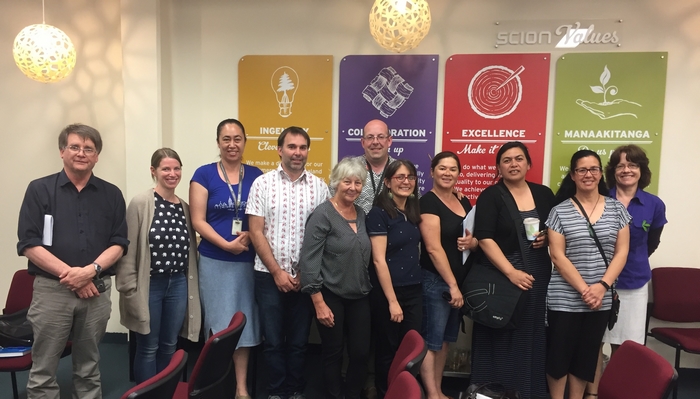Adaptive Governance - A Toolkit for Action - Beta version (8 November 2018)
Let’s hop on the same waka…
We’d like to share with you something that’s got our passion
It’s for our people and our land that we’ve got this vision
We’d love you on this waka and all that brings
It’s all about change and our decision making
If you and your agencies all come together
Tangata whenua, local authorities and whoever
If we hop on the same waka to weave our cloak
We will share decisions in the direction of hope.
Healthy land, healthy trees, many birds and lots of bees,
Our mokopuna will thrive in the land of all these.
– Mary-Anne Gloyne & Vicky Hodder.
What is adaptive governance?
Adaptive governance has been used to address a number of environmental problems around the world. The concept is founded on recognising the complexity of social-ecological problems and advocating for a flexible and collaborative approach to help solve them.
Adaptive governance calls for the design of methods to address complexity and achieve better outcomes based on the local context through dialogue and sharing power and resources.
An enduring, impact-focused partnership
Scion has been working on adaptive governance research with with He Oranga mo Nga Uri Tuku Iho Trust (He Oranga Trust) in Ruatoria, East Coast.
In partnership, we have developed collaborative research based on a combination of science and mātauranga Māori that is deeply rooted in cultural awareness, community development and capacity building. This includes an adaptive governance programme focussed on the wicked problems facing the Waiapu catchment.
The team worked with stakeholders committed to a 100-year Memorandum of Understanding between the Crown and Ngāti Porou aiming for ‘Healthy land, healthy rivers, healthy people’.
The work carried out through this research project has led to the creation of the Adaptive Governance toolkit.
Adaptive Governance Toolkit - Beta
Tackling complex environmental problems requires multiple agencies and the community to develop joint aspirations and recognise their own values and interests. Agencies and communities also need to step back and identify barriers and the resources (people, time, financial) that need to be put in place.
The tools here aim to assist others embarking on a journey of addressing ‘wicked’ problems, not only environmental but in areas such as health and education.
While the tools presented are known internationally, the richness of this toolkit is that we have developed them in a specific New Zealand context, embedding lessons from more than 100 people involved in different parts of the research.
The Adaptive Governance Toolkit includes
- Tool 1: Monitoring and evaluation – Tracking progress and change
This tool provides a framework and step-by-step process to monitor the progress and developments of a project.
- Download Toolkit 1: Monitoring and evaluation - Description [pdf]
- Download Toolkit 1: Monitoring and evaluation - Worksheet [word]
- Tool 2: Social network analysis (SNA) – Grassroots regeneration and local leadershipThis tool maps out relationships between people, groups and organisations to help community members identify and leverage leaders, influencers and resources.
- Download Toolkit 2: Social network analysis - Description [pdf]
- Download Toolkit 2: Social network analysis - Sample data collection & Informed consent form [word]
- Tool 3: Catchment 2030 – Games to tackle complex problemsThis tool prompts participants to think about their approach to problems from a different perspective and increase their understanding of each other’s outlook.
- Download Toolkit 3: Catchment 2030 - Description [176Mb pps]
- Download Toolkit 3: Catchment 2030 - Sample character profiles [2.4Mb zip]
- Download Toolkit 3: Catchment 2030 - Sample player instruction booklet [word]
These resources are freely available to use while in the beta stage. We ask that you credit Scion and He Oranga mo Nga Uri Tuku Iho Trust, and provide feedback as we work to further develop, simplify and adapt these tools to other complex problems in New Zealand.
Please send any comments or questions to: tim.barnard@scionresearch.com and let’s hop on the same waka!

Weaving the Korowai project team
*Ngāti Porou (He Oranga mo Nga Uri Tuku Iho Trust)
Funding: MBIE (Contract C04X1502) & Scion.

© All rights reserved.
